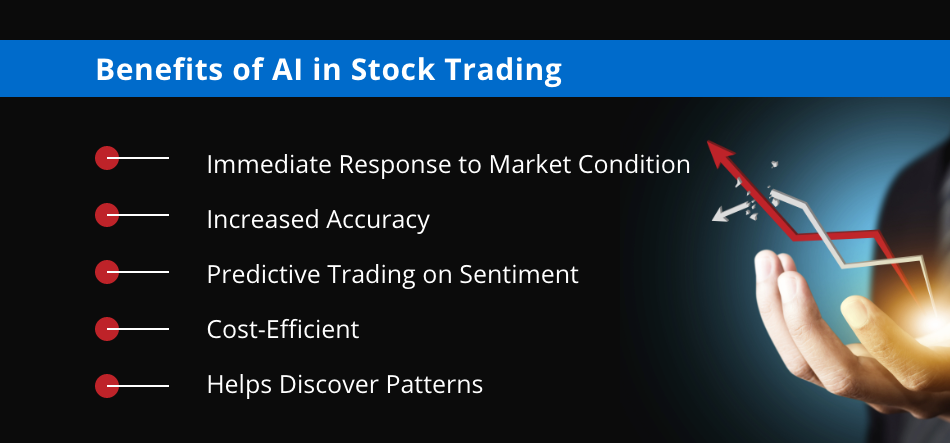When choosing a trading platform that uses AI to forecast or analyze stocks Customer support is an important factor. Reliable and responsive support will make a huge difference in solving issues, increasing utilization of the platform and ensuring an enjoyable trading experience. These are the top 10 tips for evaluating the support provided by these platforms.
1. Evaluation of Support Accessibility
24/7 Support: Determine if the platform has round-theclock assistance. It's crucial particularly for trading on international markets.
Hours of operation. If 24/7 support doesn't exist, then make sure you have support available during trading hours.
Verify that support is provided on weekends and holidays.
2. Test Response Times
Initial response Try the support staff by submitting an uncomplicated test question.
Time to resolve It is not enough to simply acknowledge the problem and then decide the time it will take to solve it.
Live chat: Examine the efficiency and responsiveness of the live chat system.
3. Assess the Support Options
Multiple channels: Ensure that the platform has support in different channels (e.g. phone, live chat, email, and social media).
Find the channel you prefer to determine if it's reliable and available.
Self-service solutions: Look for a complete knowledge base, FAQs, or community forums for quick solution-finding.
4. Evaluation of Support Quality
Expertise: Ensure support agents are well-versed in the trading platform, its features as well as technical concerns.
Problem-solving: Determine if the support agent can solve complex issues effectively or escalate these appropriately.
Professionalism. Make sure that all interactions with support were professional, courteous, efficient.
5. Find Dedicated Client Managers
Support Premium: Verify if institutions or higher-tiered plans are able to access account managers.
Personalized assistance: Determine if account managers provide tailored assistance and provide proactive guidance.
Building relationships: Make sure the account managers are on hand and build long-term relationships.
Review Documentation
Knowledge base. Check that the platform is a well-organized searchable database of tutorials, guides and suggestions for troubleshooting.
Video tutorials: See whether there are any videos tutorials on the market.
API documentation: If you're a developer, verify if the platform provides clear and detailed API documentation.
7. Examine peer and community support
Forums for users Find out if there is an active community of users or a forum on the platform, where they can exchange ideas and suggestions.
Find social media forums that aren't official (e.g. Reddit or Facebook). These groups allow users to discuss the platform.
Community engagement: Find out whether the platform's staff actively participates in community discussions or forums.
8. Evaluate Escalation Processes
Problems that escalate There should be a procedure in place for escalated unresolved problems to management or support levels.
Follow-up. Make sure whether support is following up when the issue is solved.
Feedback loops: Verify the platform's ability to collect user feedback to improve the support service.
9. Test Support in Critical Conditions
Market volatility: Call support during times of high volatility to determine their sensitivity under stress.
Technical Issues: Try to simulate an issue (e.g. login issues or data discrepancy) to observe how the support team handles the issue.
Trade execution: Check whether you can receive support for urgent issues related to trading (e.g. failure of orders delay in execution).
Reviews of User Feedback
Reviews on the internet - Read reviews written by users on websites like copyright, G2, Reddit or Reddit.
Testimonials or Case Studies Find reviews or case studies that highlight positive customer experiences.
Find out the way that the platform handles negative feedback and complaints.
Bonus Tips
Support during the trial period: You can test the support of the platform with the demo or free trial period.
Support for other languages: If not an English speaker, you should check whether there is support available.
Training and onboarding. Find out if the platform has sessions available for training or onboarding new users.
You can assess customer support for AI platform for stock forecasting and analyzing by following these tips. When you do so, you will be able choose a platform which provides prompt, efficient and reliable assistance. A customer support system that is quick and helpful can help improve your overall experience. Have a look at the best see post about ai trade for blog examples including ai investment platform, ai for stock predictions, best AI stock, best ai for trading, trading ai, ai chart analysis, trading with ai, AI stock picker, ai for investment, AI stock picker and more.

Top 10 Tips On Assessing The Regulatory Compliance For AI stock Predicting/Analyzing Trading Platforms
The regulatory compliance is a crucial aspect to consider when looking at AI stock Predicting/Analyzing trading platforms. Compliance assures that a platform's operations are within legal frameworks. The data of the users is secure and financial regulations are complied with, which reduces any risk of legal issues. Here are the top ten guidelines to evaluate the compliance with regulations of these platforms:
1. Verify the Licensing & Registration
The regulatory bodies: Make sure the platform is registered and licensed with appropriate financial regulatory bodies (e.g. SEC in U.S.A., FCA UK, ASIC Australia).
Verify the broker relationship If your platform has a partnership with brokers and brokers, be sure they are also licensed and regulated.
Public records: Search the website of the regulator to determine if the platform has been licensed or if it's been in violation of the law.
2. Measure Data Privacy Compliance
GDPR If a platform is operating within the EU or providing services to EU users the platform must be in compliance with the General Data Protection Regulation.
CCPA: California Consumer Privacy Act compliance is mandatory for users.
Data handling policies: Review the privacy policies of the platform to find out the way it describes the collection, storage, and sharing.
3. Examine Anti-Money Laundering(AML) Measures
AML policies: Make sure the platform has robust AML policies to prevent and detect cash laundering.
KYC procedures: Determine whether the platform is using Know Your Customer (KYC) that verifies the identity of users.
Transaction monitoring: Verify that the platform is monitoring transactions to spot suspicious behaviour and inform authorities about suspicious activity.
4. Verify that you are in compliance with Trading Regulations
Market manipulation: Make sure the platform is equipped with measures to stop manipulation of the market like spoofing or wash trading.
Order types: Verify if the platform is in compliance with the regulations for order types (e.g. No unlawful stop-loss hunting).
The best execution: Ensure that the platform uses best execution methods to make trades at the most competitive cost.
5. Cybersecurity Assessment
Data encryption: Ensure that the platform is encrypted to safeguard the data of users in transit and in rest.
Response to incidents: Verify that the platform has an incident response plan in place for cyber-attacks or data breaches.
Verify any certifications.
6. Transparency Evaluation and Disclosure
Fee disclosure: Verify that the platform discloses clearly all fees including hidden costs or other charges.
Risk disclosure: Ensure that the platform is transparent about all risks, especially in the case of high-risk strategies or trading with leverage.
Performance reports - Check to see if there are precise and transparent reports on performance that are provided by the platform for its AI models.
7. Make sure you're in conformity with international regulations.
Cross-border Trading: If you're trading involves international markets it is important to ensure that your platform is compliant with the requirements of each regulatory country.
Tax reporting: Find out whether the platform provides tools or reports to help users adhere to tax regulations.
Sanctions compliance - Ensure that the platform complies to international sanctions and does not allow trading only to the countries or entities that are banned.
8. Assess record-keeping and audit trails
Transaction records: To meet regulatory and auditing purposes, ensure that the platform has detailed logs of all transactions.
Logs of user activity (logs) The logs contain information about user activity. determine if the platform is tracking the user's activities, including logins and trades. Also, make sure that the settings for your account have been modified.
Audit-readiness: Determine whether the platform is equipped to provide all necessary documents and logs to support an audit by a regulatory agency.
9. Evaluate Compliance with AI-Specific Regulations
Algorithmic Trading Rules If your platform allows algorithmic trades, make sure it adheres to regulations like MiFID II (in Europe) or Reg SCI (in the U.S.).
Bias & Fairness: Check to determine if there are any biases the AI platform is able to detect and reduce in the AI model. This ensures fair and ethical trade.
Explainability: Some regulations require that platforms explain AI-driven predictions or choices.
Examine the User Feedback and the Regulatory Histories
User reviews: Read user reviews to determine the platform's reputation for regulatory compliance.
History of regulatory violations - Check to determine if the website has been convicted of any previous penalties or violations of regulations.
Third-party auditors: Check if the platform is regularly audited by a third party to ensure it's adhering to the rules.
Bonus Tips
Legal consultation: Talk to an expert on the subject to verify whether your website is in compliance with the regulations.
Trial period: Try the platform free of charge or try the demo to test its compliance features as well as the documentation.
Support for customers - Ensure that the platform is able to provide assistance for any compliance-related concerns or questions.
By following these tips to evaluate the regulatory compliance of AI platforms for analyzing and predicting stocks making sure you select an option that is within the legal framework and safeguards your interests. It is essential to be in compliance because it not only lowers legal risks, it also increases trust and confidence in the platform. Take a look at the top stock predictor for blog tips including ai options trading, ai share trading, ai in stock market, stock predictor, stock predictor, AI stock price prediction, best stock prediction website, ai options trading, chart ai trading, invest ai and more.
